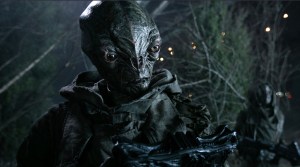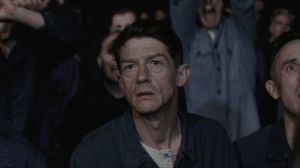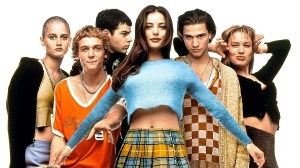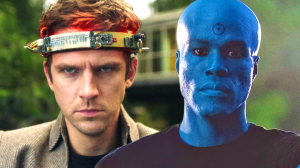Ever since starring in an adaptation of Cormac McCarthy’s The Road back in 2009, actor Kodi Smit-McPhee has been no stranger to exploring stories about the apocalypse. Whether it was an experience like in that journey, where he and his father merely hoped to stave off death as they were being pursued by cannibals in a world with little resources, or playing Nightcrawler in X-Men: Apocalypse and X-Men: Dark Phoenix as various beings threatened universal destruction, the actor is no stranger to being thrown into cataclysmic situations. This trend continues in his new film 2067, which hits select theaters, On Demand, and Digital HD on October 2nd.
Videos by ComicBook.com
In the film, by the year 2067, Earth has been ravaged by climate change and humanity is forced to live on artificial oxygen. An illness caused by the synthetic O2 is killing the worlds’ population and the only hope for a cure comes in the form of a message from the future: “Send Ethan Whyte”. Ethan (McPhee), an underground tunnel worker, is suddenly thrust into a terrifying new world full of unknown danger as he must fight to save the human race.
ComicBook.com caught up with Smit-McPhee to talk about the appeal of apocalyptic narratives, being forced to confront those concepts in the real world, and highlights from his career.

ComicBook.com: So you filmed this movie, I assume last year or possibly earlier?
Kodi Smit-McPhee: Honestly, I’m the worst person with time because I just take things as they come and then lazily forget time and just trudge through. But I would say late last year I finished it, and I shot in Adelaide, and I think it was only like a month and a half. It was quite a short shoot.
It’s okay, you’re not being quizzed on when you shot it. The reason I ask is because it was surely before the coronavirus pandemic, which feels to some people like an apocalyptic situation. You were also in The Road, which had an apocalypse, and shows like The Walking Dead envision this end of humanity and those shows are some of the biggest things on TV. What do you think it is about apocalyptic stories that are so fascinating to people?
Obviously, it must be the most radical form of, I don’t know, would you say a radical form of terror in a way? A lot of it comes from when the end of the world will come. But, selfishly, I think a lot of the time we don’t think it will be in our existence. Which I think is why we find ourselves in the place where we are today, which is moving closer to 2067. So hopefully we can take 2067 as somewhat of a, yes it’s entertainment, but it is a cautionary tale and even more so, as you said, now, it’s reflecting nature more than ever. Everyone that worked on the film, the director Seth [Larney], [co-star] Ryan [Kwanten] I’ve connected with recently, we’re just in shock at how much the world has come to revolve around this story.
Not to make light of the pandemic we’re in, but I’m curious how you’ve been handling it and your perspective on it. Last year, getting to do this sci-fi, “Oh, I get to do this cool, fun, post-apocalyptic story that’s compelling and interesting,” and then a few months later, you realize that it’s obviously not fun at all and it’s not enjoyable. I think a lot of the fun of apocalyptic stories is fantasizing about a global reset, but now we’re all aware that it’s not a fun fantasy. So I’m curious, did you feel, not that the film prepared you for what we’re going through, but I’m just curious about what kind of reflection you might have been doing.
Honestly, I’m 100% not going to put myself under the category of a “conspiracy theorist,” because, ultimately, I think that is already a somewhat propaganda-ish slang to throw upon people who actually use their time wisely and seek things that aren’t taught, not handed out to us. Such as the media, schools, the things that our parents were indoctrinated by, et cetera. I put a lot of time towards, ever since I dropped out of school because of my industry, I had a lot of time to myself. So I basically followed all of the curiosity that I had for the universe and for my place within it. And one side of that was absolutely filled with beauty and wonder, and that was in the nature of science and what is the ultimate goal for our purpose here and the universe itself.
But then there’s the other side to it that is kind of sadistic and a bit more sinister. And that is the stranglehold that people have on this world and people have on other people. I know that went very deep, but to make a complete 360, I am in a constant state of not being shocked, if I can put it that way. Because there’s a lot of things that I feel like I see coming, and a lot of people see coming. I’m not putting myself on a pedestal, I’m not trying to be a false prophet or anything, but I’m simply just putting in the time to study these things and to see the direction of where the world’s going and why people don’t want to talk about it. I’m just in a constant state of, “Well, I kind of saw that one coming.”
I know that sounds cocky, but it’s just true. It’s just crazy, I want to take to Instagram and say, “I told you so.” Because I posted a whole lot of crazy stuff back in the day where I was talking about this and vocal about it, but, “He who knows stays silent.” So I’m ultimately just sitting, watching the world burn. But no, that’s why I take my status in my industry to vocalize the things that can be hard to be vocal about as an individual. The world is so opinionated, and it’s so touchy these days, that even when you think you are pursuing truth and expressing only love and peace, we’ve seen this since the ’70s. That can be quickly redirected and turned against you. So if I can do it under the guise of the entertainment industry and the characters I play, in the views that I hold myself, with the media towards you, then that’s how I’ll make an impact.
I get what you’re saying, it’s not that you’re claiming you knew things like this would happen, it’s that you’re always hoping for the best, but expecting the worst. And then, unfortunately, things end up being the worst, but you still have hope.
Yeah. I mean, I could’ve said a while back, I would post things about how, if a crisis was to go down, how the procedure, that the world would take an action towards it. And, ultimately, the people would be affected. Their freedom would be affected. Countries would be divided in opinion. And, ultimately, the state of countries would be divided, and it would just be mass chaos and division, and everyone would slowly go insane. And that feels very close to what we are experiencing, and I feel like a lot of movies have expressed that truth, too. So, I don’t know, I feel like it’s up to the people themselves to come to that truth to realize that these aren’t just movies. Movies, they take a lot of effort to make. It takes a lot of courage and bravery to instill a truthful message within a movie behind the guise of its symbols and its stories and its characters.
So that needs to be taken into consideration. Until then, though, I’m definitely not trying to be any savior. I realized the best thing I can do is just look after myself and focus on my health and focus on bettering myself. That’s the best way I can make an influence without trying to point and tell people where the world’s going.
And 2067 isn’t your first time dealing with the apocalypse, as you faced it in The Road over a decade ago. That film ends with your character meeting a new family, and I have my own opinions of that, both the book and the movie, but I was curious if you saw the ending of the film as hopeful.
I like to take the route that it was hopeful. I like to take the belief that that was a family that was following him and his father the whole time. And they ultimately knew the fate of his demise, that his father would maybe one day get sick and this kid would be left in a world of apocalypse. But yeah, I like to take the hopeful side, but I’ve literally spoken to Cormac McCarthy and I’ve asked him what does he think. And obviously the director, as well. And he’s said it’s up to you. So it is what it is.
Another genre project of yours that I love was ParaNorman, and I know you’ve likely aged out of voicing that character, but I was curious if, in the years after its release, if there were ever talks about doing a sequel or spinoff that never came together?
That’s very interesting that you said that because the last caller just said that. No, that hasn’t been spoken about and, unfortunately, just from my experience working with [animation studio] Laika, I have watched their process of how they work, and I think this is healthy for anyone within the industry; they don’t like to get caught on their successes. And I’m not even speaking of ParaNorman, but I feel like Coraline was one of their greatest movies, but for them, they continue to go above and beyond. And we’ve seen them do that I think with two more movies recently, it was like Kubo [and the Two Strings] and [Missing Link]. They leave what they’ve done in the past and they just kind of excel tenfold. So I’m not sure if we’ll ever see ParaNorman again. I think that will be kept in the beautiful little story it was, but we will continue to see amazing stories from the commitment of Laika to their craft.
*****
2067 hits select theaters, On Demand, and Digital HD on October 2nd.








